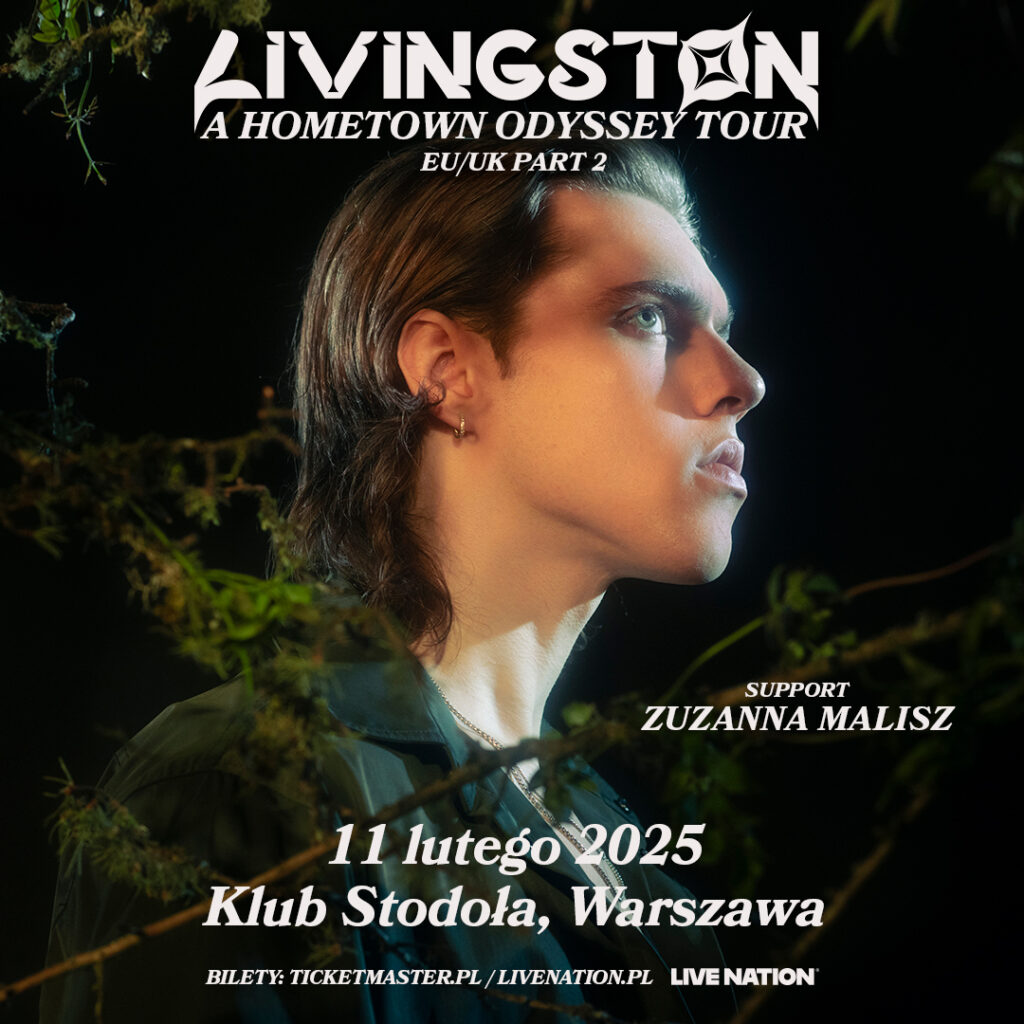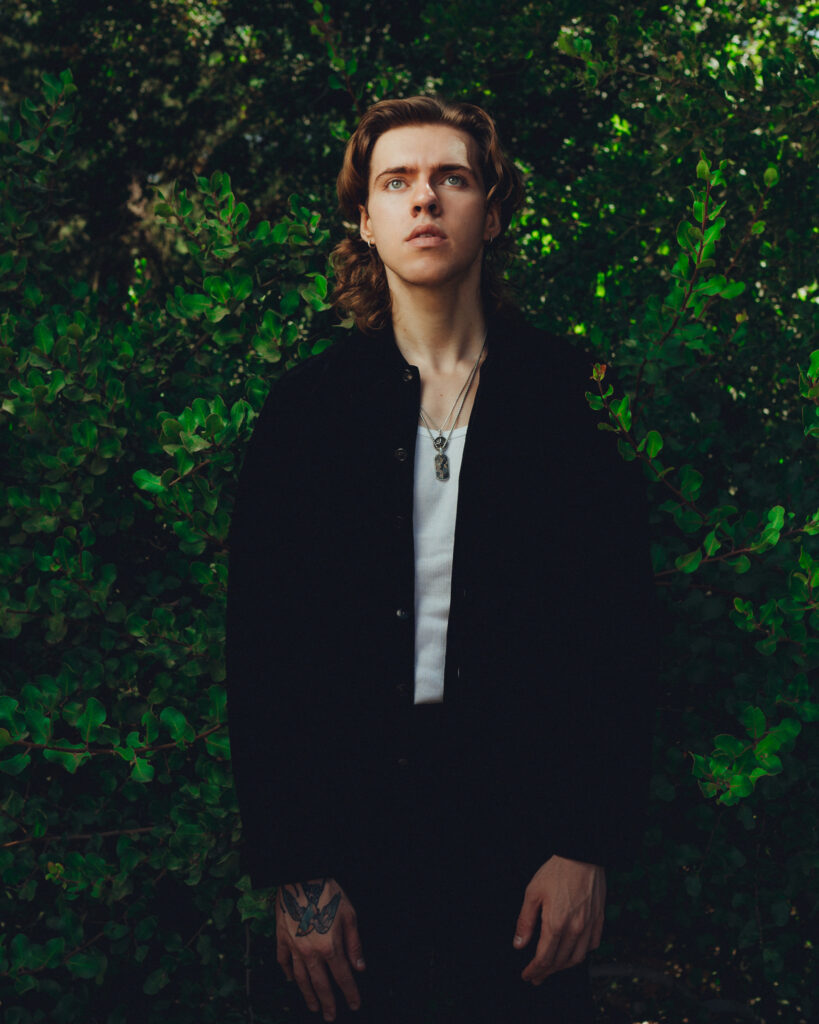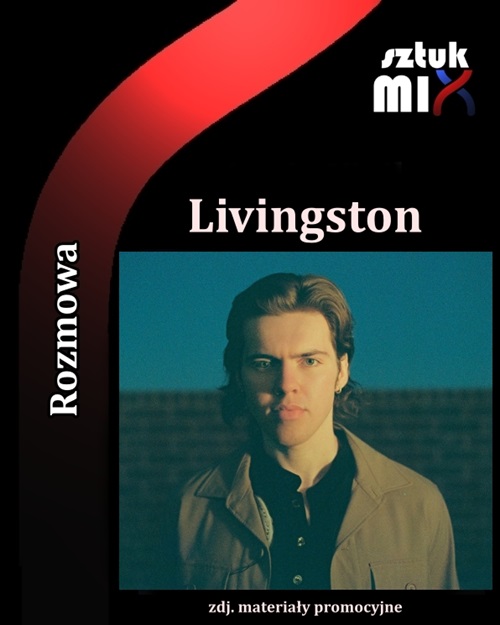English version below/Angielska wersja niżej !!!
Ma zaledwie dwadzieścia dwa lata, a na Spotify miliony odsłuchań swoich utworów. Na jego debiutanckiej płycie „A Hometown Odyssey” z 2024 roku narratorem został nagrodzony Oscarem aktor J.K. Simmons. Drake Jon Livingston Jr., alt-popowa sensacja z Denton w Teksasie, porozmawiał z nami tuż przed swoim koncertem w Warszawie (11.02.2025, Klub Stodoła), a w rozmowie opowiedział o najnowszym singlu, wymarzonej artystycznej współpracy oraz o tym, dlaczego w każdy występ wkłada maksimum wysiłku.
Natalia Glinka-Hebel: Cześć Drake, miło cię widzieć!
Livingston: Cześć, miło cię poznać Natalia, co słychać?
NGH: Przepraszam za złe oświetlenie, ale teraz w Polsce jest już prawie wieczór, więc robi się coraz ciemniej. Myślę, że przekonasz się o tym na własnej skórze, gdy odwiedzisz nasz kraj. Z tego co czytałam – popraw mnie jeśli się mylę – będzie to twoja pierwsza wizyta w Polsce.
Livingston: Tak, jak najbardziej pierwsza. Zawsze byłem podekscytowany przyjazdem, spotkaniem z tutejszymi słuchaczami i nie mogę doczekać się występu!

NGH: Czy jest coś, co słyszałeś o Polsce lub coś, co chciałbyś tutaj zobaczyć lub zrobić?
Livingston: W Polsce jest szczególna energia wokół muzyki pop i singer-songwriterów, a polscy fani są bardzo przychylni singer-songwriterom – to zawsze mnie ekscytowało. Mam wrażenie, że to po prostu wczesny rynek, na którym pojawiają się nowi artyści, co jest naprawdę odważne i myślę, że bardzo fajne. Jestem podekscytowany spotkaniem z tutejszymi fanami i przekonaniem się o tym na własnej skórze.
NGH: Mamy całkiem sporą scenę muzyki alternatywnej, do której myślę, że pasowałbyś idealnie. Będziesz miał również polski support podczas koncertu w Warszawie [przed Livingston wystąpi Zuzanna Malisz].
Livingston: Tak, to bardzo ekscytujące!
NGH: Czy to ktoś, kogo sam znalazłeś, czy to była jakaś sugestia?
Livingston: Mój management przejrzał wszystkie europejskie zgłoszenia i staraliśmy się wybrać lokalny support w każdym mieście. Tak samo było z Polską. Zawsze okazujemy wsparcie lokalnym zespołom i z ekscytacją czekamy na efekt.

NGH: Cóż, klub w którym wystąpisz ma naprawdę fajną energię. Nie jest zbyt duży, ale myślę, że idealny do występów z taką muzyką jak twoja. Mam nadzieję, że ci się spodoba. Chciałam zapytać też o twój najnowszy singiel, Brainstorm, ponieważ w zasadzie przyznajesz się tam do nadmiernego myślenia i mówisz, że jest to jak miecz obosieczny, mający dobre i złe strony. Zastanawiałam się, czy to nadmierne myślenie w jakiś sposób pomaga ci w procesie twórczym, w pisaniu – czy ma na to jakiś wpływ?
Livingston: Tak, ponieważ moim zdaniem myśli są jak nasiona i niektórzy ludzie mogą po prostu rozrzucić te nasiona i zapomnieć o nich; ja mam tendencję do sadzenia ich i obserwowania, jak rosną – mogą rosnąć zarówno nad ziemią, jak i pod nią; mogą stać się gigantycznym drzewem z pięknymi łodygami lub mogą zapuścić korzenie i rosnąć w dół, zapadając się w umysł na różne sposoby. Jedna idea sprowadza się do kilku bardzo pięknych myśli. Dla mnie mają one nieco większe znaczenie, a dla kreatywności to bardzo pomocne, ponieważ pozwala na więcej wariacji, prowadzi do różnych pomysłów w tekstach i różnych wyborów produkcyjnych.
NGH: W swoich utworach jesteś bardzo bezpośredni. Zastanawiałam się, czy bycie całkowicie szczerym pomaga ci zdobyć nowych słuchaczy, nowych fanów.
Livingston: Myślę, że jedną z najpotężniejszych cech bycia człowiekiem jest to, że potrafimy stwierdzić, kiedy inni kłamią, a kiedy nie. Mamy wyostrzony zmysł, i widzimy kłamstwo nawet nie w czyichś oczach, ale słyszymy je po prostu w czyimś głosie. Możemy stwierdzić, czy dana osoba jest autentyczna. Potrafimy stwierdzić, czy próbuje zrobić coś innego niż mówi. Da się stwierdzić, czy z czymś walczy. Myślę, że szczególnie teraz jesteśmy tresowani na wielu rozrywkach; mamy mnóstwo rzeczy do skonsumowania. Myślę, że jesteśmy bardzo świadomi, kiedy coś się nam próbuje sprzedać, kiedy wrabia się nas w coś, co nie jest prawdziwe. Dlatego gdy pojawia się coś prawdziwego lub ktoś mówi coś od serca, ludzie nadstawiają uszu. Jeśli o mnie chodzi, kiedy byłem młodszy, zdałem sobie sprawę, że muszę być szczery, jeśli mam zajmować się muzyką.
NGH: Cóż, nadal wymaga to więcej odwagi niż śpiewanie o pieniądzach czy narkotykach, więc jako słuchaczka naprawdę to doceniam, ponieważ dzięki temu w niektórych momentach czuję z tobą rodzaj połączenia. Dzielisz się swoją wrażliwością i nie twierdzisz, że jesteś superbohaterem, masz wszystko, czego chcesz i wszystko idzie dobrze w twoim życiu. Myślę, że na tym polega siła twojej muzyki. A skor rozmawiamy już o tej szczerości – jak trudno jest ci występować z tak intymnymi piosenkami przed ogromną publicznością? To również wymaga dużej odwagi.
Livingston: Myślę, że jest to dość płynne i przychodzi naturalnie, ponieważ to ćwiczę i spędzam na tym dużo czasu. Występowałem już tyle razy, że swój występ znam na pamięć. Ale dwie rzeczy, które pochłaniają dużo energii, to emocjonalne połączenie, czyli bycie tam dla ludzi, a nie tylko odwalenie fuchy. Chodzi mi o prawidziwe bycie obecnym. Wiedząc, że dla mnie to zaledwie jeden występ z 20, a dla nich jeden jedyny chcę, żeby to był najlepszy występ, na jakim byli. Chcę, aby był lepszy niż koncerty, na których byli w 10 razy większych salach koncertowych i chcę, aby był dla nich lepszy niż te, na których byli w mniejszych salach. Wiem, że jedyną rzeczą, jaką mogę zrobić, by na to wpłynąć, jest osobisty kontakt. To wymaga sporo energii. Do tego dochodzi nieprzewidywalność choroby i zdrowia oraz fizyczne wymagania. To bardzo energetyczne show. Ale w tym sensie myślę, że naprawdę fajnie jest mieć okresy, które są bardzo wymagające, ponieważ lubię myśleć, że umysł, ciało i serce dostosowują się do tych rzeczy. I to czyni cię silniejszym. Powiedziałbym więc, że trasa koncertowa to zdecydowanie jeden z najtrudniejszych okresów w moim życiu. Ale też nie cały czas. To może jedna trzecia lub czwarta mojego roku. Muszę stawiać sobie wysoko poprzeczkę i ją przeskakiwać. A potem inne okresy to przechodzenie pod nią. Lubię myśleć, analizując występy, że dzięki tym okresom wycofania wracam silniejszy. Jestem też w stanie bardziej się zaangażować, dać bardziej emocjonalny występ i bardziej być tam dla moich fanów.
NGH: Chociaż powiedziałabym, że jesteś raczej na początku swojej kariery, brzmisz bardzo dojrzale, jakbyś przygotowywał się do tego momentu przez całe życie… Ludzie lubią kategoryzować, umieszczać rzeczy w miejscach, które znają, szczególnie w przypadku muzyki; lubią nadawać etykietki… Ilekroć czytam o Twojej muzyce, każde miejsce w zasadzie nadaje jej etykietkę alt pop. Chciałam zapytać, jak się z tym czujesz i czy jest jakieś inne miejsce lub gatunek, w którym byś się widział – czy to w przyszłości, czy teraz.
Livingston: Jak by to powiedzieć… Nie chodzi o żargon czy niepotrzebne etykietowanie, ale wiesz, podpisałem kontrakt z dużą wytwórnią i oczywiście chcemy, aby w pewnym momencie moja piosenka trafiła do radia. Patrząc na artystów, którzy podbili świat w ciągu ostatnich kilku lat, można odnieść wrażenie, że musisz najpierw dotrzeć do węższego grona publiczności, zanim wypłyniesz na szersze wody. Tak naprawdę nie myślę w tych kategoriach. To nie jest moja dziedzina wiedzy. Nie wiem, jaki ma to wpływ na moją karierę ani jakie ma to znaczenie. Wiem tylko, że nigdy nie myślałem o moich ulubionych artystach jako o etykietach i zdecydowanie uważam, że gdy muzyka trzyma się etykiety, którą jej nadano, to po prostu nie jest tak dobra. Wszyscy artyści, których kocham, tworzą najlepsze rzeczy, jakie potrafią. Wyłamują się poza schematy i zdobywają fanów z różnych grup i gatunków, ponieważ ich piosenki są po prostu dobre. Myślę, że to powinno być celem. Zobaczymy, jak potoczą się moje losy, gdzie zostanę zaszufladkowany, a gdzie nie. Ale staram się po prostu myśleć o tworzeniu jak najlepszych rzeczy.
NGH: …albo najwięksi artyści w ogóle nie przejmują się etykietami – po prostu robią swoje… Wspomniałeś również o graniu swoich piosenek w radiu. Jak się czujesz, gdy słyszysz swoje własne utwory? Czy od razu żałujesz, że nie zrobiłeś czegoś inaczej [ze swoją muzyką], czy może czujesz się z siebie dumny?
Livingston: Czuję się, jakbym był dumny z młodszego brata; czuję się dumny z młodszej wersji samego siebie. Nigdy nie czuję się zobowiązany ani uwięziony przez piosenki, które nagrywam. Nigdy nie czuję, że chcę coś zmienić, ponieważ za każdym razem, gdy kończę piosenkę, za każdym razem, gdy ją odtwarzam, moje serce wyrywa się z piersi. Czasami zajmuje to tydzień, czasami miesiąc, ale jestem dumny z każdej wersji siebie, która to zrobiła. Oczywiście zawsze jestem bardziej podekscytowany tym, nad czym teraz pracuję. To błogosławieństwo i przekleństwo.
NGH: Mam do ciebie ostatnie pytanie, i chciałabym, żebyś użył swojej wyobraźni – czy jest jakiś zespół lub artysta – żywy lub martwy, nie ma ograniczeń – z którym chciałbyś współpracować i nagrać piosenkę lub cały album?
Livingston: Sia ma ogromny dar do sięgania w niezwykłe rejony i jest na szczycie mojej listy. Również Chris Martin, Jon Bellion i mój mentor Rami Yacoub, który jest niesamowitym szwedzkim autorem piosenek. Gdybym mógł zrobić album z tą czwórką, czuję, że wydarzyłoby się coś bardzo fajnego.

NGH: Życzę Ci w takim razie współpracy z nimi wszystkimi, może nawet naraz. A jako że mamy właśnie prawie początek nowego roku – masz jakieś postanowienia noworoczne na 2025?
Livingston: Zawęziłem rzeczy w moim życiu, w których chcę być doskonały. Są to relacje, zdrowie, utwory i występy. Chcę, aby wszystkie te cztery rzeczy były doskonałe. W zamian za to, nie mam nic przeciwko temu, by wszystko inne nie było tak dobre przez cały czas. Po prostu odpuszczam rzeczy, które mógłbym zrobić i staram się skupić na tych czterech obszarach.
NGH: Podoba mi się takie motto: nie wszystko, nie na raz. Myślę, że każdy może je wykorzystać w swoim życiu.
Livingston: Tak, to niemożliwe.
NGH: Niektórzy ludzie wciąż w to wierzą, więc w tym tkwi problem.
Livingston: Cóż, niech nauczą mnie w takim razie, jak to osiągnąć. [śmiech]
NGH: Nikt tego nie potrafi, ale niektórzy wciąż w to wierzą. Trzymam kciuki nie tylko za koncert w Warszawie, ale za całą europejską trasę. Nie mogę się doczekać, kiedy pewnego dnia włączę radio i usłyszę Twoją piosenkę w najpopularniejszych stacjach radiowych w Polsce. Nie jest to kwestia czy, a kwestia kiedy, bo jestem pewien, że tak się stanie.
Rozmawiała Natalia Glinka-Hebel
English version
He is only twenty-two years old and already has millions of listeners on Spotify. His debut album from 2024, A Hometown Odyssey, features Oscar-winning actor J.K. Simmons as narrator. Drake Jon Livingston Jr., an alt-pop sensation from Denton, Texas, spoke with us just before his concert in Warsaw (11.02.2025, Stodola), and in the interview he talked about his latest single, his dream artistic collaboration, and why he puts maximum effort into every performance.
Natalia Glinka-Hebel: Hi Drake, it’s so nice having you here!
Livingston: Hi, great to meet you Natalia, how are you?
NGH: Sorry for the bad lighting, but now in Poland it’s almost evening, so it’s getting darker and darker. I guess you’ll see that on your own quite soon when you visit our country. From what I’ve read – correct me if I’m wrong – this will be your first visit to Poland.
Livingston: Yes, it’s very much the first time. I’ve always been excited to come, to meet the people there and I’m very excited for the show!

NGH: Is there anything you’ve heard about the country or anything you are looking forward to seeing or doing here in Poland?
Livingston: There is a particular energy around pop music and singer-songwriters in Poland and Polish fans are very embracing of singer-songwriters – that’s always excited me. It always feels like it’s just an early market to catch on to new artists, which is really adventurous and I think very cool. So I’m excited to meet the fans there and try to prove it.
NGH: We’ve got quite a scene of alternative music I think you would fit perfectly. And you are also going to have a Polish support during your concert in Warsaw.
Livingston: Yes, very exciting!
NGH: Is it someone you found or was it some kind of suggestion? Did you click, both of you?
Livingston: My manager has gone through all of the European submissions and we try to be intentional about selecting local support options for each city. So the same with Poland. Always showing love to local bands and excited to hear the outcome.

NGH: Well, the club you’re going to perform in has really nice energy. It’s not so big, but I think it’s perfect for performances with such music as yours. So I do hope you will enjoy it. I wanted to ask about your newest single, Brainstorm, because you basically admit there to overthinking and you say that this is like a double-edged sword, having good and bad aspects. I was wondering if this overthinking somehow helps you in your creative process, in your writing – does it have any influence on that?
Livingston: Yes, because I think thoughts are like seeds and some people can just scatter those seeds and forget about them; I tend to plant them and watch them grow – they can grow both above ground and below ground; they can become a giant tree with beautiful stems or they can grow roots and grow underground, sink into the mind in different ways. One idea comes down to some very beautiful thoughts. For me thoughts have a little bit more significance, and for creativity that’s very helpful, because it allows more variations of the thought, gives way to different ideas in different lyrics and different production choices.
NGH: Well, you are being very straightforward in your songs in general. I was wondering if being totally honest helps you gain new listeners, new fans. How do you feel?
Livingston: I think that one of the most powerful traits of being human is that we can really tell when other people are lying or not. We have an acute sense, just not even in someone’s eyes, but just from someone’s voice. You can tell if they’re being authentic. You can tell if they’re trying to do something else. You can tell if they’re fighting something. I think especially now, as humans, we’re being trained on so much entertainment. There’s now so much stuff to consume. I think we’re hyper aware when we’re being sold to, when we’re being kind of gambled into something that’s not real. So when something real pops up or someone, you know, says something from the heart, I think people’s ears kind of perk up because we’re used to hiding as it’s an easier thing to do. But for me, I just realized when I was younger that I have to be honest if I’m going to do this.
NGH: Well, it still requires more bravery than singing about money or drugs, so I would say that, as a listener, I really appreciate it as, at some points, I can feel connected to you because of the experiences you share. You share your vulnerability and not claiming that you’re a superhero, you’ve got everything you want and everything goes out well in your life. I think that’s the power of your music. Speaking of this honesty, how tough is it for you to perform with such intimate songs in front of huge audiences? This also requires a lot of courage.
Livingston: I think it’s pretty fluid and comes naturally because I train for it and I spend a lot of time doing it. I’ve done a show so many times I know it backwards and forwards. I’m not going in as a lyric or a moment in a set. But the two things that take a lot of energy are the emotional connection, like really being there for people and not just phoning it in or throwing in the towel, but being present, knowing that to me this is one show of 20, but to them, this is one show of one. And I want it to be the best show they’ve been to. I want it to be better than the show they’ve been to that are in 10 times the size of games and I want it to be better for them than the shows they’ve been to in smaller games. And I know the only thing I can do to influence that is the personal connection. So that takes quite a deal of energy. And then also just the unpredictability of sickness and health and just the physical demand. It’s a very energetic show. But in that sense, I think it’s actually really nice to have periods that are very challenging because I like to think that, you know, the mind and the body and the heart kind of adapt to those things. And it makes you stronger. So I would say touring is definitely one of the hardest periods of my life. But it’s also not all the time. It’s maybe a third or fourth of my year. I have to push. And then other periods are pulls. And I like to think, as I’ve analyzed the shows, because of those pullback periods, I come back stronger. And I’m also able to engage more and do a more emotional performance and be there for my fans better. So it’s definitely a dream, but it’s worth it.
NGH: Well, although I would say that you’re rather at the beginning of your career, you sound very mature, as if you were preparing for this moment your whole life… I was also wondering about the fact that people like to categorize, to put things in the places they know, especially with music; they like to give labels… Whenever I read about your music, each and every place basically gives it the label alt pop. I wanted to ask how you feel about it and whether there is any other place or genre you would see yourself in – maybe in the future or even the one that you see yourself now.
Livingston: I think that’s mostly like, how do I say it… Like, not jargon or just like unnecessary labeling, but, you know, I signed to a major label and, obviously, we want a radio song at some point; there has to be a foot in the door somewhere. So I think that with the general thesis of looking at artists that have taken on the world in the last few years, you kind of have to go narrow before you go wide to explain it to people, and then to also allow it to sink its teeth in on a niche audience. I don’t really think in those terms. It’s not my field of expertise. I don’t really know what kind of impact it has or what label it does or doesn’t mean to my actual career. All I know is that I’ve never thought of my favorite artists as labels and I definitely think that when music stays stuck to the label that it’s given, it’s just not that good. All the artists I love truly pushed it and made the best stuff they can. They break outside of boxes and gain fans from all sorts of different groups and genres because the songs are just good. I think that should be the goal. We’ll see where the cards fall, where I get boxed in or don’t. But I try to just think about making the best stuff I can.
NGH: …or the greatest artists don’t care about the labels at all – they just do their job and their stuff… You’ve also mentioned putting your songs on the radio. How do you feel when you hear your own songs – either there or on some Spotify playlist? Do you immediately feel the need to have done something else, something differently [with your music] or do you feel proud of yourself? What’s the most common feeling for you?
Livingston: I feel like I’m proud of a little brother; I feel like I’m proud of a younger version of myself. I never feel beholden to it or trapped by the songs I put up. I never feel like I want to change anything because whenever I’m finished with a song, whenever I play the song and my heart is just beating out of my chest. Sometimes it takes a week, sometimes it takes a month. But I feel like I’m proud of whatever version of myself made that, but I’m obviously always more excited about what I’m working on now. It’s a blessing and a curse.
NGH: I’ve got the last question for you, but I would like you to use your imagination – is there any band or artist – living or dead, sky’s the limit – you would like to collaborate and record either a song or the whole album with?
Livingston: Sia just has an immense gift to tapping into elsewhere, and she’s kind of on my Mount Rushmore. Also Chris Martin, Jon Bellion and my mentor Rami Yacoub, who is an amazing Swedish songwriter. That’s probably my Mount Rushmore. If I could do an album with those four, I feel something very cool would happen.

NGH: I wish you all of them, maybe even at once. And as we are just having almost the beginning of a new year – do you have any New Year’s resolutions for 2025?
Livingston: I’ve narrowed down the things in my life that I want to be excellent at. Those are relationships, health, songs, and shows. And I’m going to take those four things. And I want all of those four things to be excellent. And in exchange, I’m okay with everything else not being everything, you know, all at once all the time. So just letting go of all the things I could do and trying to focus on those four things to really take it to the next level.
NGH: I really love the motto: not everything, not at once. I think everyone can use that in their life.
Livingston: Yeah, it’s impossible.
NGH: Some people still believe it is, so that’s the problem.
Livingston: Well, show me the way. [laughs]
NGH: No one has found it, but some still believe that. I’m keeping my fingers crossed for not only the concert in Warsaw, but the whole European tour. I’m looking forward to turning on my radio one day and listening to your song in the most popular radio stations in Poland. I am not saying if, I am saying when, because I’m sure that would happen.
Natalia Glinka – Hebel
Obserwuj nas w mediach społecznościowych:


